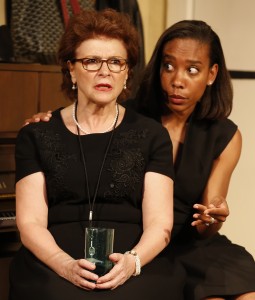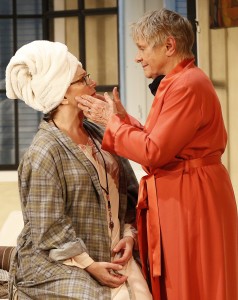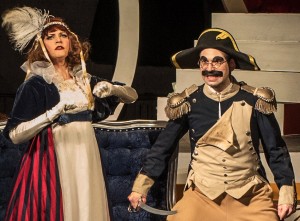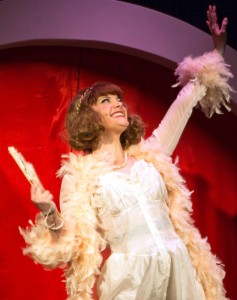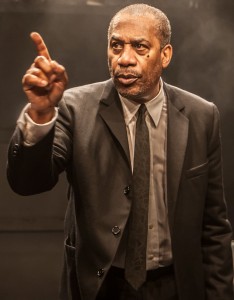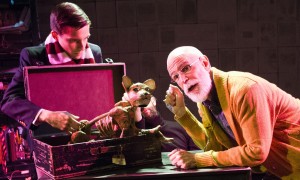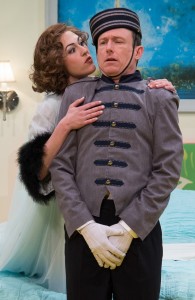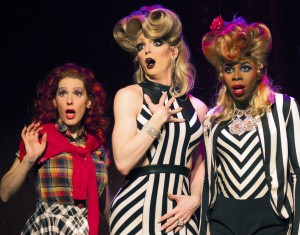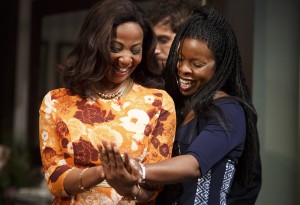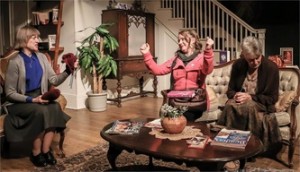Can a sinner become a saint? That is the question John Wulp explores in The Saintliness of Margery Kempe, first produced in 1958 at the Poet’s Theatre in Cambridge, Mass., and last seen in an Off-Broadway production the following year. The story is loosely based on the real life of Margery Kempe, a woman who lived in the 14th century and wrote the first known autobiography in Western literature. At the beginning of the play, Margery (the wonderful Andrus Nichols, who brings an energetic intensity to the role) declares, “Morality, damn all morality, damn, damn, damn.” A feminist long before the feminist movement, she seeks to shrug off the assumptions that inform her role as mother, housewife and religious community member. She hates it all and leaves home.
Loveless Texas
Inspired by Shakespeare’s Love’s Labor’s Lost, Boomerang Theatre Company’s Loveless Texas is a toe-tapping musical comedy set during the early years of the Great Depression. Although many of the characters hold the same names as in the Shakespeare play, the story begins with a twist: Berowne Loveless Navarre (the hugely talented Joe Joseph) and his buddies—Duke Dumaine (Colin Barkell) and Bubba Longaville (Brett Benowitz)—are playboys who travel from New York to Paris. Along the way they do all the things that upstanding young men shouldn’t be doing: chase women, drink liquor and spend the Navarre family money.
My Name Is Gideon: I’m Probably Going to Die, Eventually
Every now and then a theatrical experience comes around that breaks the mold. It’s no simple task to categorize Gideon Irving’s performance piece running at the Rattlestick Playwrights Theater. Part musical, part stand-up comedy, (very small) part magic act, and part intriguing night in a complete stranger’s living room, My Name Is Gideon: I’m Probably Going to Die, Eventually is far from a one-trick pony. On the contrary, the hour-and-45-minute show is constantly surprising audience members with laughs, gasps, songs and even snacks!
A Classic Comedy Conquest
Playwright Oliver Goldsmith found fame with his play She Stoops to Conquer in 1773, despite his rather unfashionable social reputation among London’s upper crust. Indeed, Goldsmith made it his life’s work to go against the grain, and She Stoops to Conquer exemplifies his disdain for Sentimental Comedy—a genre that was en vogue in the first part of the 18th century. Those saccharine works featured one-dimensional characters whose apotheosis was meant to instill what Sentimental playwright Richard Steele haughtily deemed “a joy too exquisite for laughter.”

Goldsmith, on the other hand, was a champion of hearty laughter, which this play—when produced well—can stir up in droves. Compared to Sentimental characters, Goldsmith’s characters are imperfect, and therein likable. The Actors Company Theatre (TACT) is staging a slightly imperfect (and therein quite likable) production of Goldsmith’s important play, directed and adapted by Scott Alan Evans. The moments when this production shines most are when it is faithful to Goldsmith’s unique genre of “laughing comedy,” aimed to elicit belly laughs with physical ridiculousness and silly twists of plot.
She Stoops to Conquer presents a bouquet of delightful characters—two eligible ingénues, a couple of bachelors from the city, and a pair of meddling parents—all of whom are subject to the playful deceits of the puckish Tony Lumpkin (Richard Thieriot). The action takes place at Mr. and Mrs. Hardcastle’s estate in the English countryside. Their daughter Kate (Mairin Lee) and their ward, Constance Neville (Justine Salata), are excited to receive two handsome young suitors (Charles Marlow and George Hastings, played by Jeremy Beck and Tony Roach) at the estate that evening.
Tony, who also happens to be Kate’s illegitimate brother, foils the plan when he intercepts the suitors at the village pub. Wanting to free himself of his mutually undesired betrothal to Constance, Tony concocts some of his signature meddling. Bringing the suitors to the estate, Tony leads them to believe that they are staying a night at an inn—and that the elder Hardcastles are actually innkeepers. This creates room for Kate, disguised as a barmaid, to woo the painfully shy Marlow, and for her cousin Constance to pursue her true love Hastings.
Overall, the cast seems to enjoy themselves in this genre. Thieriot as Tony absolutely sparkles with his mix of conniving wit and lowbrow buffoonery. As his bumbling parents, Cynthia Darlow and John Rothman are adorably befuddled by their son’s antics. Things really get good after intermission, in which Tony sends his enraged mother and Constance on a 40-mile carriage ride to nowhere, and Mr. Hardcastle finally snaps after being treated like the help in his own home. The two sets of young lovers deserve even more spice, however, especially in light of their comic counterparts; perhaps that could be created with more emphasis on physical humor rather than delivery of language.
One distinct aspect of this production is its intermittent puncturing of the fourth wall. Evans’s direction leans heavily on this device, employing a considerable amount of direct audience interaction and unmasking of the usual theatrical dressings. For example, there is no backdrop to hide the actors as they await their entrances. Instead, they are visibly seated in two rows of chairs on either side of the stage, which is a raised platform. Admittedly, Goldsmith's original script contains plenty of asides—monologues that characters deliver directly to the audience—but by stripping the stage bare, Evans’s adaptation carries the meta-theater several steps further. The bits of audience interaction between scenes undermine the actors’ comic choices and interrupt the flow and style of the play. All in all, however, this nontraditional choice does not sink the production, which provides both a fun night at the theater as well as an opportunity to experience one of England’s most important and beloved plays.
TACT’s She Stoops to Conquer plays at the Clurman Theatre at Theatre Row (410 West 42nd Street between Ninth and Tenth avenues) until Nov. 5. Tickets are available online here or by calling the TACT Member Hotline at (212) 560-2184 or (212) 947-8844.
Is It a Crime?
Director Whitney Aronson’s approach to August Strindberg’s rarely produced Crimes and Crimes is to streamline and bring out the dark comedy that the play encompasses. Her adaptation of the Swedish playwright’s work has been updated to present-day New York City. She has taken the attitude that the realism and harsh events that occur in the original version undermine the notion of it as a comedy. For her adaptation, she says in a note, she wanted the audience to see and understand Strindberg’s play. Aronson’s version begins with Jean (Ivette Dumeng) and her show dog Maid Marian (played by actress Katie Ostrowski), a Hungarian sheepdog, frolicking in the park, enjoying their time as they wait for Jean’s husband, Maurice (Randall Rodriguez). Emile, Jean’s brother, later joins them, and they discuss Jean’s concern that Maurice is planning to leave her. (Aronson doesn’t explain why these residents of New York should have French names.)
Jean is afraid that she will not be able to afford Maid Marian’s dog show expenses if Maurice divorces her. Emile and Jean speak of how Maurice, an author, rarely takes her on his book tours or to social affairs. She tells Emile, “I don’t know, but I have a feeling that something dreadful is in store for me.” Suddenly Maurice appears and begins caressing Maid Marian, whom he clearly loves. He also gives the impression that he loves Jean and enjoys her company and physicality. In fact, he invites her to the opening of one of his plays and she refuses. She tells him she will be better at home with Maid Marian. They part ways, and the play begins to unfold the “something dreadful” that Jean fears.
Maurice goes off to meet and start an affair with Henriette (Christina Toth), who is in a lesbian relationship with his close friend (a man plays the friend in Strindberg’s original). The tension increases: Maurice must now decide if he stays with his wife or goes with his new lover. As he contemplates his decision and how difficult it would be to see Maid Marian if he divorces Jean, the dog mysteriously dies.
One of Aronson’s most radical changes to Strindberg’s original text is that Maid Marian is a replacement for the mistress’s daughter. She writes that she made this choice because she wanted the play to be more believable: “I actually did it because in the original, the child dies and nobody really cares.”
Although there’s a logic behind Aronson’s choice, it may not resonate with the same intensity as Strindberg’s. “I thought that the audience would not be able to forgive anyone in the play for so easily moving on from the death of a human child. A treasured animal’s death, though tragic and upsetting, is more consistent with the general reaction and behavior that Strindberg’s characters demonstrate.”
But even though the change from child to animal does lighten the mood and makes Maurice’s actions somewhat more forgivable, some of the plot stretches credibility. After the dog’s death, animal law enforcement appears to investigate the crime. As serious a crime as animal abuse is, it seems rather fantastical that a Broadway-type play would be pulled because of animal abuse. In any case, Maurice is charged as the main suspect, but he is eventually exonerated. Within hours of his release, Maurice’s reputation is ruined, and his play is pulled.
Whether the choice to change the daughter to a sheepdog is fully justified or not, it does not take away from the lightness of the play. It does, however, make the circumstance melodramatic and absurd, which brings out the humor in the play.
Matthew Hampton and Holly Albrach’s costuming of the characters is impeccable: fashionable and in line with the current New York scene. They employ an approach to the Hungarian sheepdog that seems to draw inspiration from puppet theater. It was entertaining and just simply delightful to the eye.
The sound design by Andy Evan Cohen makes the transition between scenes lively, using instrumentals of popular pop songs. They are played with a classical twist, so the audience is left to try and identify the familiar tune.
Aronson has accomplished her goal. The play has witty moments and comic scenes. The absurdism makes for great melodramatic humor as well. The revision keeps the audience focused on its entertaining and engaging story for the entire duration.
Crimes and Crimes plays through Aug. 20 at the Gene Frankel Theatre, 24 Bond St., in Manhattan. For tickets, call (212) 868-4444 or visit www.strindbergrep.com.
’Tis Better to Have Loved ...
Out of the Mouths of Babes, a fun new situational comedy by Israel Horovitz, explores both the light and dark sides of life. In it, four women, three older and one younger, gather on the eve of a funeral. The deceased was a man they were all either married to or lovers with. In the opening scene, Evelyn (the remarkable Estelle Parsons) and Evvie (the earthy yet fiery Judith Ivey) meet in his apartment. It is familiar to them both because they lived there at apparently separate times. However, it turns out there was some overlap, and you know what that means.
Added to the mix is the morose Janice (Angelina Fiordellisi, an actress with the commanding and stentorian voice of an old-school stage actress, and founding director of the Cherry Lane Theatre), who was not invited at first because she was thought to be dead—she has a history of suicidal tendencies. Her first attempt was out a window in the very same room where they are all meeting. She left him for the same reasons the others did: infidelity. Marie-Belle (effervescently played by Francesca Choy-Kee), the thirtysomething kooky and idealistic most recent girlfriend of the departed (who was 100 when he passed away), has invited them all here. She appears to have psychic access to the deceased man and channels his thoughts as well as appears to remain, literally, in touch with him when she breaks into fits of laughter from the tickling matches he engages in with her from beyond the grave.
Death, rarely welcome, but always inevitable, can provide a microscope for the living to look at their lives in the present. Although at first they are cynical and even antagonistic toward one another, the women develop a rapport and join together in their concern for Janice. Whenever they lose sight of her, they immediately bond and frantically ask: “Where’s Janice?” And, unfortunately, at one moment when the other women are caught up in a reminiscent reverie about the past and the man who is now gone, their worry proves valid. There is nothing funny about suicide, but a topic can be made funny by the right ratio of drama to comedy. Under Barnet Kellman’s direction, the balance is perfect.
Neil Patel’s scenic design not only captures the airy and orderly nature of a Parisian apartment but is further complemented by the warm and intimate space of the Cherry Lane Theatre where the play is running. Paintings adorn the walls in Parisian salon style (and turn out to be the works of famous actors such as Rosie O’Donnell, Billy Dee Williams, and Joel Grey, among others). The one painting, however, that is given the most attention is Untitled Peonies, a work that Evelyn recognizes as her own creation from when she lived in the apartment in the ’60s. She can’t believe he still has it hanging on the wall.
Each of the women—Evelyn, Evvie, and Janice—left the man for the same reason. His unfaithfulness drove them away, but the initial bitterness and anger over his infidelity covers up the sadness and lament for the loss of a great love. When Evvie says, “He was a collector,” she means it as a bad thing. However, Horowitz suggests that collecting things, like lovers or paintings of former lovers, is a way of celebrating life.
Marie-Belle turns out to have an odd agenda. She extends the idea that they should all live together after the funeral. She claims she is rich, and although she appears to be an interminable airhead, has made a lot of money playing the stock market on advice from a friend. Between the apartment and the money, she feels they could have a good life together. Perhaps she is onto some kind of new age, enlightened concept of co-housing. Janice jumps at the chance, rather than out the window again. Evelyn, who is 88, and Evie, who is 68, warm to the idea. It’s attractive, not only because of their age, but because, truth be told, they are lonely, and living together may be a good antidote. They certainly know the apartment, and for all the bad memories, there are lots of good ones as well. It was their home once before. Why not again?
Israel Horovitz’s Out of the Mouths of Babes is playing at the Cherry Lane Theatre, 38 Commerce St. (near Sixth Avenue South). Evening performances are at 7 p.m. Wednesday through Saturday; matinees are at 3 p.m. Wednesday, Saturday, and Sunday. For tickets, call OvationTix at 866-811-4111, go online to www.cherrylanetheatre.org, or purchase them at the Cherry Lane box office.
Jesters of the Jazz Age
The Marx Brothers—four actual brothers, best known for their timely political commentary, sophisticated puns and physicalized comedy—left no stone unturned. They poked fun at everyone and everything: aristocrats, hobos, history, and especially relationships between men and women. I’ll Say She Is, now at the Connelly Theater, written by Will B. Johnstone, went to Broadway in 1924 and put the Marx Brothers on the map. Their rise was mercurial, and they made many movies that spread their popularity even wider.
But I’ll Say She Is, unlike their other stage shows, never became a film. It centers on a rich heiress named Beauty, played by the lovely Melody Jane, whose problem—“Society Woman Craves Excitement”—headlines the newspapers. The Marx Brothers, actors looking for work, are sent by their casting agent to woo her, and presumably get money from her. After all, her problem seems to be of great local concern. Fabulously rich, she lives with her also very wealthy aunt, Ruby, played by Kathy Biehl, who lends the role the right amount of stentorian authority. When the Brothers arrive at Ruby and Beauty’s door, the butler, played comically by C.L. Weatherstone, asks: “Gentlemen, did you come by appointment?” to which Chico responds, “No, we came by subway.”
The literal use of language is what made the Marx Brothers so brilliant. When Chico asks Harpo to cut the cards, he takes out an ax and chops them up. However, their comedy doesn’t completely rely on fast-paced antics. Instead, there are many quieter, more theatrical moments, as well as moments that showcase the array of talent the Marx Brothers had. Harpo was a gifted harpist, and Chico learned to play the piano with a special one-handed technique, and the actors successfully capture these talents.
When actors play famous personae, we want to see exactness, but what we really should be looking for is likeness. The four actors who play the Marx Brothers do a fantastic job of capturing the broader aspects of each of the brothers’ personas. And personas they were. Matt Roper captures Chico’s tight-lipped, one-sided grin, casts the sideways glances that made Chico seem both wary and earnest. Seth Shelden plays Harpo’s muteness with energy. Harpo was a pickpocket of sorts, and to recreate this theatrically takes a certain kind of magician’s ability. In one scene, Ruby suspects that he has stolen some cutlery, but she then backs off her claim. At the same time, several forks, spoons and knives fall out of Harpo’s sleeve. Shelden masters the great physical control needed to play Harpo’s mute but mischievous character.
Groucho was surprisingly successful in romance. The older women adored him for his quasi-romantic nature, and sharp humor. During a scene while courting Ruby, she calls, “Ah! My dear! At last I’ve found you.”
Groucho: “Yes, my darling, here I am.”
Ruby: “I was referring to my niece.”
Groucho: “Well, I’ll have you on your niece in no time.”
However, his exaggerated black eyebrows, painted thickly above his own, the long waistcoat, and cigar dangling from the side of his mouth make him also the most comical-looking. Noah Diamond does a wonderful job of getting Groucho’s famous walk just right with the back bent forward, and knees in a deep plié that often made Groucho look like he was gliding across the room.
And last but not least, Matt Walters plays Zeppo with all the leading-man charm reminiscent of those classic film stars Cary Grant and Clark Gable. Beauty falls in love with him at the end of the play and realizes that “there is no greater thrill than the thrill of love.”
Diamond lovingly restored the lost script by working with Johnstone’s rehearsal notes to adapt the play to the Connelly Theater, a historic venue dating back to the mid-1800s. Director Amanda Sisk, choreographer Shea Sullivan, and musical director Sabrina Chap do a marvelous job of capturing the voluptuousness of a Broadway revue during the age of vaudeville. The play, produced by Trav S.D., includes an array of 10 chorus dancers who are a triple threat: they dance, sing, and act. And of course, they all tap-dance. In their sparkly art deco dresses they bring an additional vibrancy to the stage that makes the play all the more fun in its reminiscence of a vaudeville spectacle.
I’ll Say She Is runs through July 3 at the Connelly Theater (220 E. 4th St., between Avenues A and B). Evening performances are at 8 p.m. Thursdays through Saturdays and at 7 p.m. on Sunday; matinees are at 2 p.m. Sundays. Tickets are $35 ($25 for students and seniors), available at 212-352-3101 or www.illsaysheis.com.
The Tongue Is a Mighty Sword
Move over, James Brown. It’s time to add Joe Morton and Dick Gregory's names to the pantheon of hardest-working men in show business. In Turn Me Loose, written by Gretchen Law and directed by John Gould Rubin, Morton gives a tour de force performance as Gregory, the tireless civil rights activist and stand up comic known for his acerbic social satire on race and American politics.
Morton, of the hit TV show Scandal, adeptly captures both the younger and the older Gregory as the play moves back and forth in time. As a comedian, Gregory eloquently holds a mirror up to the contradictions in American society. Although he believes economics are at the root of many problems in society, he contends that “poverty is not the worst disease on earth. Racism is.”
Born in 1932, in St. Louis, Gregory says he had “black assets: fast feet, and a fast tongue.” He was athletic and outspoken, and when he was given a three-year contract at Hugh Hefner’s Playboy Club in Chicago in 1961, he was catapulted into another realm as an entertainer, not as a “shuffling minstrel, but as a 28-year-old star.” However, he often stepped down from comedy to take up the cause of the 1960s civil rights movement and march side by side with Medgar Evers.
Morton captures the conflict between being a performer and being an activist that caused Gregory to take pause at moments in his life. In a chilling moment, the young activist gets a bad feeling that he can’t shake before heading back down South to join Evers. But suddenly his son dies and he returns North to join his wife. Only two weeks later, Evers is assassinated; Gregory believes his personal tragedy spared his life. The dangers of activism and being a black man in the South in the ’60s were never more apparent. He realizes that the "racist system is nothing but a shadow. You got to dive through—every day could be your last.” He also realizes that bigotry is like the barb of an arrow piercing the skin. Gregory returns to comedy and aims, not so much to extract the arrowhead from the sides of American racists, but to shake them with enough laughter that it will fall out.
Morton’s voice has a deep timbre, and he has amazing reserve and control over both his voice and physicality. Often, while the tempo and volume rise, his body is restrained and still. Near the finale, sweat pours down his face, and instead of taking the handkerchief, as he does at times throughout the play, he forges through what he has to say: the power of his words is amplified by the apoplectic state of his face.
The raw immediacy of Morton’s performance, coupled with the power of Gregory’s message, incites some members of the audience to murmur “Mmm-hmmm” and “Yeah,” as if they are receiving a message from the pulpit rather than the stage. Also helping tell the story in a variety of roles is John Carlin; among other things he plays a bumbling mediator at a loss for words when Gregory delivers an acerbic diagnosis of the state of economics and its effect on all that ails American society.
It takes tremendous courage and intelligence to design and deliver the kind of comedy Gregory does. At 83, he's still going strong. Because of his work with the civil rights movement, and the way in which he has relentlessly, with humor, grace and a tongue like a sword, dissected the contradictions about race in America, the conversation itself has since taken a few twists and turns. For instance, Vin Diesel, who rose to stardom in The Fast and Furious films, declines to accept any racial pigeonhole. Rather, says one observer, Diesel presents himself as “a multiethnic Everyman.” The actor’s insistence on identifying himself as a human being, rather than by race, is an important step. As Turn Me Loose makes plain, it’s one that Dick Gregory has worked tirelessly for.
Turn Me Loose plays at the Westside Theatre (407 West 43rd St.) through July 3. Evening performances are at 7 p.m. Tuesday, at 7:30 p.m. Wednesday and Thursday, and at 8 p.m. Friday and Saturday; matinees are at 2 p.m. Saturday and at 3 p.m. Sunday. Tickets are $79 and may be purchased by calling (212) 239-6200 or visiting www.turnmelooseplay.com.
High on the Buy
Shoes and Baggage is a wildly entertaining one-woman show that explores shopping, and life. Written and performed by stage veteran Cheryl Stern (whose Broadway credits include La Cage aux Folles and The Women) and directed by Joe Barros, both actor and director do a marvelous job of using the cell theater, a small space that is more of a theater in the rectangle than the round. Nonetheless, all seats are good, and musical director John Dipitino’s soundtrack, performed by a two-man band with drum, keyboard and guitar, adds pizzazz and drive to the performance, but don’t overwhelm the diminutively sized actress.
Stern hits the nail on the head when she reveals her conflicted relationship to shopping. She manages a delicate balance between revealing the inner turmoil as well as the ameliorating effects of shopping during some of life’s more difficult moments. The dialogue is intimate but not, as kids today say, TMI (too much information). A self-confessed connoisseur of clothing, shoes and baggage, she recalls her experiences buying her first Louis Vuitton bag and to “buy, or not to buy” a pair of Louboutins that cost as much as her weekly paycheck.
Weaving in past experiences that go all the way back to childhood with more contemporary experiences, Stern does a fantastic job. She touches on relationships that have influenced and informed her appreciation for clothing. Two in particular are with Rena and Karen, whom she remains fast friends with in life and shopping. When Stern first meets Rena in a college acting class, she is completely taken by her. Dressed in a rabbit fur coat, Rena is “urban-sexy in a Bianca Jagger sort of way.” It turns out Rena can’t act but the two form a bond. Akin to this relationship is the one she forms with Karen while out walking her dog one day. Karen is a former Ford model and disco queen and, when they meet, the ad director of Vogue. They embark on many shopping excursions and Karen verses her in the world of couture.
Stern’s play is also an autobiographical account of her experience as an actress. She hilariously renders her experience as a cast member of The Women, a Broadway production that included Cynthia Nixon, Jennifer Tilly and Kristen Johnston. She forms an unlikely bond with Tilly, who has a great appreciation for unusual jewelry and fashion. When Stern compliments Tilly on some rings she’s wearing, she captures Tilly’s relaxed and off-the-cuff cadence with her reply: “Super-cute, right?” They become friends with an appreciation for fashion, and after one particular shopping spree, nearly miss curtain call.
It’s not only the wild forays into shopping that Stern captures, but the addictive nature of it. While trying to return a sweater at a high-end retail store, she ends up leaving with a pair of pants and a top, in addition to the sweater she initially goes in to return. When she sings: “High, totally high from the buy…,” it explains the thrill of going home with new purchases. But then, when she feels compelled to hide them in the closet so her husband won’t see them, there’s the shame in knowing that they exceed her budget, and she failed in returning a sweater that wasn’t really perfect after all.
Stern outlines the way shopping can alleviate some of the stress that occurs in life. When friends get sick with cancer, or lose their jobs, or her father is in the hospital after a heart attack, shopping and an appreciation for clothing, shoes and baggage somehow make the moments more bearable. Yet, as Stern grows older, she comes to recognize that shopping is an addiction as serious as any other. She sings “High, totally hooked on the high, take another hit, like breathing air, oh the lure of what to wear.” Through Debtors Anonymous and self-help books filled with daily affirmations she comes to terms with the fact that shopping is only a high, and not a real antidote to life’s problems. It’s uncertain how she will live without the “high of the buy,” she says, but it seems like it’s time to try and face the music of her addiction, and let that “good buy” go.
Shoes and Baggage, is playing at the cell, 338 West 23rd St. (between 8th & 9th avenues) through June 3.. Take A/C/E train to 8th Ave at 23rd Street. Evening performances are at 7 p.m., Wednesday through Sunday, with matinees at 2 p.m. on Saturday and Sunday. No late seating is permitted. Tickets are $35. For more information, call (646) 861-2253, visit www.thecelltheatre.org.
The Secret's Out
Gorey: The Secret Lives of Edward Gorey is a delicious observation of a well-lived, if secret, life that is easily enjoyable even if one hasn’t heard of the subject. A writer, illustrator, and animator who is best known for his macabre cartoon books for children, such as The Doubtful Guest and The Unstrung Harp, and the opening graveyard credits of the PBS series Mystery!, Gorey left a treasure trove of ephemera and memorabilia when he passed away in 2000. Drawing from 1,074 items in Gorey’s home, writer and director Travis Russ has crafted an engaging script, assembled a trio of charming and vibrant actors and a production team that bring to life a vision of the artist, brimming with creativity.
Phil Gillen, Aidan Sank, and Andrew Dawson play Gorey at three stages of his life: in his early 20s after college, in his late 30s, and just before his death, in his mid-70s. They interact easily with one another and occasionally break the fourth wall to address the audience. Although the dialogue carries an undercurrent of “What would you tell your younger self?” it has much more to it.
In one instance, it’s clear the older Gorey (Dawson) knows the answers to the younger Gorey’s query but won’t say, leaving the younger version (Gillen) visibly shaken. In the moments where the older Gorey relives events from earlier days, Dawson shines. Sank, the middle-aged Gorey, delves into the collection of vintage postcards of dead children with curiosity and deference. What is unique about the actors is that all three share similarities, including mannerisms and inflections. However, each delivers the attributes of the character in keeping with his period of Gorey’s life.
Russ and Carl Vorwerk, who designed the set, fill the intimate space with memorabilia, creating an atmosphere in keeping with Gorey’s collecting habits. Three tall, open-shelving units are filled with leather traveling cases, LPs (including Balanchine, a Gorey favorite), a Harvard scarf, and a myriad of notebooks. The back wall is complete with hundreds of 8½” x 11 sheets of paper with Gorey’s drawings and writings.
There is a moment or two near the end where Gorey falters and seems unsure where it should end. The scenes and transitions linger a little too long, and it’s evident that the play is winding down, but when? Having used a voice-over interview previously, the use of it again seemed redundant for the finale.
For the greater part of the evening, Gorey is smart and cleverly crafted from the things the quixotic artist left behind. Gillen, Sank, and Dawson make the absolute most with the great material provided, as well as one another, in a well-equipped playground. Even seated with their backs to a third of the house, they never forget the audience, engaging them at every turn. The young Gorey enjoys one of the best lines, “You know, my friend Ted Shawn, the choreographer—he used to say, “When in doubt, twirl.” Gorey never has to resort to twirling.
Gorey: The Secret Lives of Edward Gorey is playing at HERE, 145 Avenue of the Americas through May 22. (Entrance is on Dominick Street one block south of Spring Street.). Take C/E trains to Spring Street stop. Tickets are $18, For more Information and tickets, visit www.LifeJacketTheatre.org or here.org, or call 212-352-3101.
Vive ‘Le Dingdong’!
Director Hal Brooks unbridles five actors in The Dingdong, Mark Shanahan’s updated adaptation of Georges Feydeau’s 1896 farce Le Dindon. He propels it even further into the absurd by having those five actors bring to charming, boisterous and nuanced life 12 distinct characters.
The farce begins with Lucy Vatelin (Rachel Botchan), a married woman, attempting to slam the door on an overzealous suitor, Pontegnac (Bradford Cover). With Pontegnac’s arm and leg precariously lodged in the door, she is leaning against it, insisting he go away. “Everyone this side of the Seine heard you shout that you wanted to make passionate love to me!” she complains loudly, while screaming for her husband to save her. Unfortunately, Pontegnac is an old friend of her husband (Chris Mixon).
Lucy has another suitor, Redillon (Brad Heberlee), who calls on her as well. With Vatelin out of the room taking a business call, Redillon and Pontegnac square off. Meanwhile, Mme. Pontegnac (Kelley Curran), suspecting her husband's infidelity, has followed him to the Vatelins’ home, where Lucy, worn down, makes a pact with Pontegnac, agreeing to have an affair with him if her husband should ever be unfaithful. Pontegnac knows full well he hasn't been.
The first-act characters include Fabiola (also Curran) as Vatelin’s Italian lover, who has traveled to Paris (with her Hungarian husband) to find him and profess her love. The second act introduces even more, at The Hotel Ultimus, with doors slamming, a 17-year-old bellboy and a Parisian policeman (both played by Heberlee), luggage mix-ups, a French chambermaid, an old, practically deaf woman (Botchan) with uncontrollable flatulence, and a New Yorker named Mandy (Curran).
Two multifaceted performers capture the pure essence of farce in their multiple roles. Kelley Curran bursts onto the stage as the epitome of a sophisticated, bold Frenchwoman and shortly after reappears as an Italian lover with all the bravado of an early Sophia Loren. Act II opens with Curran as Mandy and, only to outdo herself, she closes the play as a fetching French maid. Wigs, costumes and shoes take an actor only so far in a role—Curran is each character.
Heberlee is also a delight, energetically embodying three characters—the flamboyant, sex-driven Redillon (who is a doppelgänger to Feydeau), the bellboy and the policeman. It is his role as Redillon in Act I, at one moment writhing on the floor and professing his love to Lucy, and in the next attempting to explain to Vatelin why he is on the floor (he is cleaning, after all) that is the most endearing. During the standoff with Pontegnac the actors pose like two preening cocks in the farmyard, arguing who is the greater lothario (“I would never discuss matters of intimacy with another man’s wife”).
Cover appears to have the most difficulty playing multiple characters, relying on his best Tim Conway impression, at times shuffling or gasping before each line. Act I finds him and Botchan in awkward and unnecessary movements with odd pacing.
Designing a 1938 French townhouse, Sandra Goldmark uses striking black and white striped walls, a sunrise-yellow floor, and tone-on-tone fabric chaises for Act I. Lighting designer Mike Inwood adds a wonderful layer of sunlight streaming through a lattice window. In Act II, at the Hotel Ultimus, there are bright green and yellow panels with a matching headboard and bedspread. A brief set change and the scene becomes the Honeymoon Suite of the Hotel Rue Cromartin, where the stagehands, decked out à la Marcel Marceau, replace the fabric with bright red floral patterns, as well as a painting of the Eiffel Tower.
Working in concert with the set designer, costumer Amy Clark mixes and matches contrasting colors and patterns. Her attention to detail with smart wigs and colorful hats, down to gartered socks and Redillon’s man-about-town look, is like pure icing on a Pimm’s Cup cupcake from Prohibition Bakery.
George Feydeau is one of the most famous writers of bedroom farce, and Mark Shanahan’s adaptation is a remarkable homage. Witty banter, along with exaggerated physicality, are at the heart of The Dingdong. Even the most pursed lip might be cajoled to laugh out loud.
Performances run through May 15 at the Pearl Theatre, 555 West 42nd St., (212) 563-9261. Tickets are $65 regular, $85 premium ($40 members, $20 student rush, $20 Thursday rush). Visit pearltheatre.org for specific dates and times.
Tongue, Meet Cheek
Follow Nasty Drew (no not a typo) and the Harder boy (well, there is only one after all) as they attempt to solve The Mystery of the Family Jewels, a fun, sexy, raucous evening of tongue-in-cheek comedy, a little drag (hello, family jewels?) and some outrageous burlesque. What burlesque has to do with a spoof of the teen-mystery-novel genre is a good question, but somehow they seriously pull it all together and take it all off.
The mystery is set up by Franklin W. Dixon and Carolyn Keene, respective authors of the super sleuths’ series, The Hardy Boys and Nancy Drew. Tigger! as Dixon and Fancy Feast as Keene are as colorful as their names, in a Dead Men Don’t Wear Plaid kind of way, and create a playful, publishing-world rivalry. When Dixon attempts to engage Keene in a dialogue about the Hardy Boys, she dismisses him with, “Those two boys, always carousing around in that flashy convertible, always seeking to emulate and please the Hardy patriarch. Such strong father issues.” Dixon, not to be outmaneuvered, refers to Nancy Drew’s “questionable relations with those lady ‘cousins’ of hers…” The evening is filled with double entendres (“It’s even more colossal than my ‘Case of the Mysterious Hole in the Wall’”) and early Batman/Boy Wonder dialogue (“Jumpin’ catfish, what is it?”) Laughter, mixed with a ton of silliness and a whole lot of skin, will certainly chase the workday blues away.
Dixon and Keene introduce Nasty Drew (Nasty Canasta) and That Harder Boy (Chris Harder) who take on solving The Mystery of the Family Jewels, which is written and directed by Harder. In the course of the investigation, they meet with the buxom Lady Sussanah LaVeux De Cock; her bawdy cousin Mona Crackers; randy Police Chief McDaniels; the mechanic with lesbian tendencies Nadina North; and Cecilia “Sissy” LaVeux De Cock, Lady LaVeux De Cock’s estranged “twin” sister, among others. (The characters are played by a rotating cast of performers based on the show’s schedule.)
In The Mystery of the Family Jewels the puns, sight gags and extraordinary burlesque keep coming. Pearls Daily as Mona Crackers, who is purportedly from the wrong side of the tracks, delivers a 1920s style flapper number in a wonderful homage to the queen of burlesque, Gypsy Rose Lee. Nasty Canasta follows with a funny and entertaining undercover number employing a fake nose, glasses and mustache, which at first glance seems silly, but just wait.
Feast, who also plays North, Brookeville’s “semiretired, show-stopping sensation of stage and screen,” performs a most bodacious burlesque piece and steals the show with dialogue in the manner of legendary Mae West. Not to be outdone, the men have their own time baring all in the limelight. Ben Franklin as Police Chief McDaniels pulls off “You’ve gotta have a gimmick” burlesque that is straight—in this context used loosely—from Gypsy with hula hoops, the unbelievably limber Tigger! takes it down to a sock puppet, and Chris Harder woos the fans in his unforgettable, charming style, sock garters and all.
The show is sponsored in part by a few local businesses, and commercials are written into the script to promote them. It’s a fun gimmick that needs more attention to detail in the venerable, radio announcer style. Although issues with the show's sound and lighting may be attributed to the slightly random performance schedule, the biggest drawback is that some comic lines can’t be heard and sound levels overpower a few of the songs.
It’s evident that the Mystery of the Family Jewels has a following with a rowdy, adoring audience in attendance, and it’s easy to see why. The cast, taking their lead from Harder and Canasta, has a blast giving their all and baring all. If they break character or a prop doesn’t appear as expected, don’t be surprised, it just adds to the frivolity.
Performances of Mystery of the Family Jewels are 10 p.m. April 29 and May 13 and 9:30 p.m. May 1 and 15 at the Laurie Beechman Theater inside West Bank Cafe (407 West 42nd St.at Ninth Avenue). The theater is accessible from the A,C,E,N,R,V,F,1,2,3 trains at 42nd Street. Tickets are $22, plus a $20 food/drink minimum. A $35 VIP ticket includes reserved seating, a gift bag and a meet-and-greet. To purchase tickets, call 212-352-3101 or visit www.SpinCycleNYC.com.
I Want to be Your Friend
Very much like a schoolgirl dancing around her room, Alicia Dattner begins her one-woman show, The Oy of Sex, with a rousing version of “I Want to be Your Lover” by Prince. As she settles she begins to engage the audience by talking about sexual experiences. Dattner kids around and says, “O.K., you first.” The evening proceeds into an autobiographical journey exploring the world of sex, more specifically love and sexual addiction. “You–we–will never be the same, from this night forward.” Tall order. Her background as a stand-up comic is clearly evident by her delivery, timing, and most importantly, storytelling.
Dattner takes the audience to her early puberty days with “Dear Diary, I can’t wait until the kissing starts!” and then she practices kissing with her hand aka Señor Wences. For her high school and college years Dattner says, “it’s kind of like my clitoris was slutty, but my cervix was a prude.” Eventually she surrenders her virginity after listening to “April in Paris” when the guy she was seeing didn’t leave. “This must be what love is, right?” to her eventual disappointment, “I waited 21 years for that? It’s just his penis going in and out?” and Dattner mimics the motion with her hands. There are some great lines in The Oy of Sex as one might expect from a seasoned stand-up comic. Describing her boyfriends and sexual adventures, Dattner is often quite funny. “Max was sort of like a frat boy, without the college. Not a catch. More of a catch and release. He was so dumb that he thought anthology was the study of ass holes.” Dattner also says, “My dad's family is Jewish, and my mom's family is atheist. So I want to marry a doctor who's good enough for me, but I don't believe he exists.” Pause, rimshot. The performance rests comfortably between stand-up comedy and a working copy of a ‘chick flick.’ What’s missing is a range of emotion.
Dattner is smart, funny, entertaining, talented and full of energy. Her delivery of getting hit on by another woman, Anastasia, was complete with wild abandon even as she was faking it with "When Harry Met Sally" style. It was almost as if watching Anastasia go down on her–it was that good. When Dattner is asked to reciprocate Dattner's expression is priceless. But this performance is not just comedy nor is it stand-up. As Dattner continues through the many lovers and trips to Burning Man it gets clear that sex and love for her is a problem, and instead of a new lover she seeks help. Dealing with addictions, while serious, can be funny and still be enlightening. The confluence of a great writer with a talented actor can bring out the depth that comes with the desperate actions of an addict wrapped up with self-effacing humor. Dattner’s range remains in the realm of stand-up, and make no mistake she is quite funny.
Whether Dattner’s choice, or her director Tom Bentley-Fisher, she uses a hand-held microphone the entire performance. It is not necessary for a theater like The Bridge. As a stand-up comedian working a large house it is indispensable or it can be useful for sight gags. It is phallic, after all. However in this experience it boxed her in as a stand-up comedian. While she is quite adept at choreographing her use of a microphone it got between her and the audience limiting her range of emotion, especially as she attempts to express more vulnerability delving deeper into her 12-step program and interactions with her sponsor. On stage Dattner owns the word certitude, and she is incredibly self-assured; delivering a solo show you have to be. However, the development of an intimate relationship with the audience beyond being funny is lacking. It's as if she wants to bring more to the stage but is locked in an old paradigm.
Dattner brings the The Oy of Sex full circle, declaring, “Knowingly or unknowingly, your consciousness has been raised.” She goes on to say, “But from this moment forward, you're a different person.” Again, a tall order. There is a lot of laughs, and she brings an incredible amount of energy to the stage. Dattner opens her life up to intense scrutiny for everyone to see, but as good as a stand-up comedian as she is, and she has honed her craft, it still feels like stand-up. The raffle after the curtain call confirmed it.
The Oy of Sex runs until April 17 at The Bridge at Shetler Studios (244 W. 54 St. between Broadway and Eighth Ave.) in Manhattan. Evening performances are Wednesday through Saturday at 8 p.m. and Sunday at 2 p.m. and 7 p.m. on April 10 and 17. Tickets cost $20. To purchase tickets, call 212-868-4444 or visit smarttix.com.
“The Ring Has Awoken…”
Sam Gamgee, in the movie Lord of the Rings: The Fellowship of the Ring, righteously declares that "there’s some good in this world, Mr. Frodo… and it’s worth fighting for.” Good theater is also worth fighting for, and you may very well find yourself battling to get a ticket to see Fly, You Fools! Presented by Recent Cutbacks, it is currently playing Friday evenings at Peoples Improv Theater in Manhattan.
Secrets, Secrets Are No Fun
Stop for a second and think about the way in which one interacts with one’s family, the way one assimilates to one’s society, how one honors one’s ancestors, how one speaks one's truth, and most importantly, how one heals oneself. Familiar, written by Obie Award winner Danai Gurira, challenges its audiences to think of all these situations. However, it is also a play that one must watch in order to fully understand how it can be powerfully healing and a life-changing experience for the audience.
Directed by Rebecca Taichman, Familiar tells a story of a Zimbabwean family living in Minnesota. The eldest daughter, Tendi (Roslyn Ruff), is getting married in a matter of days, and her rehearsal dinner is in a matter of hours. As the family prepares for the rehearsal dinner, Tendi and her fiance Chris (Joby Earle) announce to the family that in addition to a traditional Christian wedding, they are including a Zimbabwean ritual. This unexpected turn causes secrets to be revealed, old wounds to reopen, and forces the family to speak the truths about the past.
Although not based on her life, Gurira draws upon her own experience to create a credible script. Similarities between her life and the script includes how her Zimbabwean family also moved to the U.S. and how she was raised in Iowa while the family in the play live in Minnesota. In addition, the script allows the actors to unapologetically speak Shona as she presumably also did in her household. Unlike other shows that often translates anything other than English, Familiar takes advantage of an opportunity to be authentic, as well as give any audience member who speak Shona a small taste of home.
The ensemble includes, the father Donald, played by Harold Surratt, who grounds each scene with subtle facial expressions and dialogue. Myra Lucretia Taylor as Anne, Tendi’s aunt, is a strong and demanding presence on stage that is the main person connecting the family back to Zimbabwe heritage and ancestors. Anne’s sister Margaret, played by Melanie Nicholls-King, is the glue that keeps the family under control, even when she might feel her own life is falling apart. A definite gem in the performance by being the character that continually handles her sisters Anne and Marvelous (Tamara Tunie), as well as continually attempting to keep everyone calm. Ito Aghayere as Tendi’s sister, Nyasha, whose relentless need to bring the family back to their traditions heals the family. Her energy and enthusiasm propels the play forward and brings it back to a nourishing place.
The ensemble's chemistry and impeccable timing is a tremendous success to the production. Ruff and Tunie exhibit the vulnerable bond between mother and daughter. To balance them out are the future family members, “white boy from Minnetonka,” Chris (Earle) and his brother Brad (Joe Tippett). Their natural comedic interactions add to the play and cause the audience to laugh and scream in enjoyment. Overall, it is the ensemble’s conversations and arguments that encourage open discussion about past family issues, current events and pushes the audience to question their own lives.
From any seat, the audience can see all aspects of the highly-detailed set designed by Clint Ramos. Marvelous’ and Donald’s house is two floors with hallways, real doors and family pictures lining the wall. It is a breathtaking set that anyone would want to live in, including the audience who sit in comfortably cushioned seats, as if sitting on individualized mini couches. To support this design, Obie Award winner and lighting designer Tyler Micoleau incorporates the lights into the structure of the set to allow it to seem natural. Even the window is lit so that it appears as if looking out on a snowy day in Minnesota.
Another noteworthy design element was the sound design by Tony Award winner Darron L. West. During intermission, the recordings of celebratory Mbira music by the Shona people of Zimbabwe filled the theater. With a very hectic and hilarious ending to Act One, the traditional music played during intermission is a great way to gently introduce the audience to Zimbabwean music, as well as connects with the Mbira that is presented by Nyasha during the performance.
Writer Madness
The Golden Smile by Yaakov Bressler and directed by Joey Stamp is an absurd, hilarious and energetic play that is sure to break the winter funk. The play opens with a group of characters, patients to be more exact, in a mental institution. The patients try to create a play that will save their privileges in the recreational room. Some patients have an ulterior motive to win the heart of their beloved Claude–who is never seen but heard about in songs. Theatergoers enter the patients’ world, which is filled with twists and turns, and witness what the patients will do to write their play.
The cast is fun and filled with energy. The audience gets to see a glimpse of the characters’ mental conditions and personalities. However, their personalities can be more diverse and more nuanced as the play provides the space for this type of character exploration. One actor that stands out is Sofiya Cheyenne (Group Leader). Cheyenne is captivating and delivers a strong and engaging performance. Cheyenne really puts a punch to the witty and sarcastic lines. The entire cast, Andy McCain (Writer), Jody Doo (Sarcastic Actor), Flynn Harne (The Messenger), Robert DiDomenico (Loathing Actor) and Isaac Boorstin (Angry Actor) are talented and versed in both acting and musical theater.
The songs are playful, graphic and wacky. Composer and Musical Director Zach Stamp matches the music with these wonky characters. The music moves along with the tone and nature of the play. Costume and Prop Managers Rivkah Spolin, Shelly Ben-Yshay and Carrie Pieper designed the set and costumes accordingly. The set and costumes coordinate with the vibrant personalities on stage. They do an excellent job alongside Stamp’s direction. The creative team piece this insane world together for audiences to be hooked for a whole hour!
There are two plots in this play: one of the actual play and the other of the characters’ creative play. The big plot flows and the audience clearly understands the wants of each character. They all collectively want to write this play but they have different ideas and direction on how to go about it. How they figure it out is the fun part for the audience. Eventually, the group comes to an agreement and they have a play. Their play’s plot gets a little sloppy when they begin their quest for the Golden Smile. Then again, they are mental patients so their level of coherence may be off. Bressler has to be very clear with his intention at this point. The patients show strength, courage and determination, and represent much of who they are as a group.
In the end, they create a tender story about preservation and happiness, which by the same token is ironic considering their circumstances. They find their “golden smile” as many writers or artists in general find theirs. Bressler seems to be drawing connections to how insane the writing process is for writers and what better way to show this than to have mental patients trying to write a play. It is a wonderful premise and one that many writers would agree with. This is Bressler’s first play–he has a knack for humor and sharp dialogue. Audiences will be excited to see how his work evolves.
The Golden Smile serves to be an exhilarating night at the theater. Watch it for the humor, energy, witty lines and music. It is sure to get everyone walking out with a smile and maybe even a golden one.
The Golden Smile is part of the Frigid Festival, which is showing over 150 performances in two theaters and over the span of three weeks. The festival is founded on the idea of providing theater artists the opportunity to produce their own work.
The Golden Smile runs until March 5 at The Kraine Theater (85 East 4 St. between 2 and 3 Aves.) in Manhattan. Tickets are $15. To purchase tickets, call (212) 777-6088 or horsetrade.info.
Stand-Up Presidential Campaign
Filibusted, a comic review of the current presidential campaign, is the brainchild of producing artistic director of the Phoenix Theatre Ensemble, Craig Smith, who approached stand-up comic, Al Pagano, with the suggestion of an hour-long burlesque on the national free-for-all into which the sacred task of electing the next leader of the free world has devolved. If this campaign is notable for a public that looks to outlier candidates not beholden to big money and who tell it like it is, what better way to cut through the bombast, double talk, pomposity, dogma, pretentiousness and, yes, lies, than with the gentle and not so gentle barbs of humor.
Written and performed with enthusiasm by Al Pagano and Amy Loughead, Filibusted is a reference to the perfectly legal stymying of the legislative process in the Senate with endless babble; and clearly a comment on the vociferous if also loud and meandering voices in a field of presidential hopefuls who compete mercilessly for our attention as we stumble forward in our selection of a president. It is we voters who are “filibusted” in the process, Pagano and Loughead point out. Hence the brilliant and eye-opening decision of Pagano to allow the candidates to speak for themselves, as Pagano tells us at the very outset:
“Now the reason we aren’t just jumping right into the show is that we want you to know that most of the words this evening which are attributed to the candidates are actually the candidates’ own.” Yes, let ‘em hang themselves on ropes of their own fashioning! “We didn’t change, alter or manipulate much of what they said in any way... we just took their words (out of context) and like pieces of a puzzle, inserted them into scenes of our imagining, to serve our own ends.”
Just as a surgeon might cover all of the body save the segment to which she will apply her knife, Pagano and Loughead thus manage to isolate comments by our candidates, the better to hold them up for all to view and dissect. All of this is wrapped, we are told, in “a series of scenes, sketches and games,” and here begins the fun. Between opening and closing salvos (Sarah Palin and Hillary Clinton), we will hear candidates opine on topics such as flirting (“All the women on 'The Apprentice' flirted with me, consciously or unconsciously. It’s to be expected," says Donald Trump), prenuptials, safe sex (“I’m not sure we need a half a billion dollars for women’s health issues,” says Jeb Bush), staying in shape and threesomes. We will be treated to an imagined Schwarzenegger riff on amending the constitution to allow him to enter the field of candidates and listen to the privileged power brokers of our time cravenly compete in a “race to the bottom” of their hard luck stories to suggest to voters that they are who they are not: just ordinary Joes scrambling for a living like you and me (“My school had these popcorn balls ad they looked really good. But they were a nickel. I never had a popcorn ball,” says Ben Carson).
The estimable surgeon Carson is given a sketch of his own, the better to highlight such statements as “A lot of people who go into prison straight and when they come out, they’re gay, so did something happen while they were in there?” And he asks, “How about we have a transgender bathroom? It’s not fair for them to make everybody else uncomfortable.” Although clearly a man of enormous experience in his chosen field, he alludes to the fact that he has never held office noting that, “every signer of the Declaration of Independence had no federal elected office experience.”
Stand-up includes gesture along with the written word to make its point and the exaggerations of mime in capturing the candidates was especially illuminating. Perhaps the most inspired sketch was the one called “Immigration Game” in which the audience is treated to a panorama of comments over centuries on immigration and quizzed, in multiple choice format, as to the author of the quote—present candidate or figures from the past. But better not to give away the store and leave the leavening and illumination of this sketch to the occasion of your attendance at this engaging and witty performance.
Filibusted's last performance is at 10 p.m. on Feb. 13 at The Wild Project (195 East 3rd St. between Avenue A and B) in Manhattan. Tickets are $20 and include one drink. For tickets, call 212-352-3101 or visit http://www.phoenixtheatreensemble.org/filibusted/.
Tasty to a Point
The aptly named Commedia dell’Artichoke doesn’t veer far from its roots—commedia dell’arte, the knockabout comedy style of Renaissance Italy. Carlo Goldoni’s The Servant of Two Mastersis a prime example, and although it is occasionally seen on stage nowadays, it was adapted exuberantly into the Broadway hit One Man, Two Guvnors with James Corden, who won a Tony Award for his slapstick performance.
Lord Have Mercy
According to Flannery O’Connor, “the basis of art is truth, both in matter and in mode.” And the truth is in the pudding in the revival of The Savannah Disputation, a charming and thought-provoking comedy by Evan Smith produced by Me & She Productions and ManyTracks Inc., at The Cell Theatre, the beautiful artists’ rental space in Chelsea. Set at Christmas time in Georgia, it is an exploration at the battle between the righteous. It’s the Catholics versus the Protestants in Southern style.
Two unmarried prudish Catholic sisters, appropriately named Mary and Margaret (played by Lucy McMichael and Charlotte Hampden respectively) are forced to defend their faith to Melissa (played by Katie Yamulla), an overzealous Protestant cheerleader for Jesus. The situation becomes tricky when they call in the troops, Father Murphy and their parish priest (performed by Michael Gnat) to prove his valor and set the wayward Protestant straight. They all learn some humbling lessons as they try to prove that their idea of faith is right and the other is wrong. Of course, they all learn that maybe they are really on the same side after all and that maybe organized religion isn’t always the best way to save your soul.
Understanding the details of time and place is necessary to an accurate and convincing set. Sarah Edkins was spot-on with her interpretation of an old-style Southern Catholic home in Georgia. Complete with Better Homes and Gardens and Reader’s Digest on the mahogany coffee table that anyone from the South would recognize—the only missing magazine was Southern Living.
The two sisters are like the good fairies in "Sleeping Beauty" trying to figure out which color Princess Aurora’s dress should be. Both bicker and flit around their pristine cage showing their contrasting temperaments. But Melissa, the enthusiastic holy roller, is no princess. In tight leggings, hot pink valor and flip flops, Yamulla throws on all the Southern charm to sell them on Jesus. Father Murphy is the voice of reason, who in between bites of banana pudding, enlightens them all to certain decrees of Catholicism, forcing the sisters and Melissa to question their own misinterpretations of religious dogmas.
As typical with sisters, one is sweet and unsure; the other is aggressive and hot-tempered. They are true Southern ladies of biblical proportions. While Mary is ready to barricade the fort against the forces of evil that Melissa seems to represent (Protestant white trash), Margaret is much more open to listening to Melissa’s perspective. Demanding that Father Murphy set things straight, Mary is mortified when she learns that the Catholic faith also believes that earthly bodies will rise and go to Heaven—one of the many tenants that Melissa is preaching which Mary is convinced is a lie: “You Christian Delinquent!” This sets her off in a fury to denounce herself from the Catholic faith; she rails in her denial for excommunication which Father Murphy explains to her one cannot do to themselves.
Both actresses are defenders of the faith with a scent of lavender and hot sauce. Director Katrin Hilbe gives leeway for her actors to explore the emotional life of their characters with the rich dialogue created by Smith. Mary defends herself righteously with lines such as “That is the way the Lord made it’s not my fault.” Margaret, bothered and bewildered by the contractions Melissa offers: “I just want to be buried next to somebody I know.” Sweet Melissa justifies her need to convert her wayward hostesses with retorts like “Catholics are just people too when you take away their religion.” Her phone goes off randomly at perfect times in the action with the "Mission: Impossible" theme song ringtone, enhancing the dilemma she faces trying to help guide her new friends to the true way to Jesus.
The Cell Theatre is a cozy performance space that invites the audience into a realistic home environment. The set encompassed the entire space besides the round seating for the audience. A grand piano with family portraits, a Faulknerian settee, doorways off to a kitchen and backyard, and wooden cabinets full of unopened Scotch all create the mood of old school Catholic Georgia. The use of the stairway and upper floor as part of the action was also very effective. When Mary preaches down to the others in her dismay and denunciation of Catholicism, the contrast of the giant mural of El Greco's "Christ Carrying the Cross" on the stairway wall further enhances the play's themes.
After the ammo smoke settles, they all are left shell-shocked with doubts about their religion, while also realizing they have been stripped bare of the canonical veil and are left eating their own humble pie. Through Hilbe’s direction and the ensemble of designers and actors, we see a clear picture of the battle for faith in us all. While letting us laugh at a very deep issue of the dangers of dogmatic religious beliefs, Hilbe's interpretation of Smith's masterpiece leaves us all reflecting on our own belief systems and eating a bit of humble pie, too.
The Savannah Disputation is running until Dec. 20 at Nancy Manocherian's Cell Theatre (338 West 23rd St. between 8th and 9th Aves.) in Manhattan. Tickets are $18 and can be purchased by calling OvationTix at 212-352-3101 or visiting https://web.ovationtix.com/trs/pr/952841 or www.meandsheproductions.org.
An Interplanetary Love Odyssey
Is Peter Story, the star of Men Are From Mars, Women Are From Venus Live!, an actor or a stand-up comedian? Audience members may be surprised to find that although Story uses his real name, he is in fact performing a scripted one-man play at New World Stages.
Men Are From Mars, Women Are From Venus Live! tells the story of a man, named Peter Story, whose life was changed when he saw author John Gray speak about his best-selling book by the same name. This life-altering book explains many of the differences between men and women in the hopes of making married couples throughout the world more in-sync with their feelings. Story intimately shares with the audience how the lessons from this book have affected his marriage. With perfectly-timed jokes, hilarious physical comedy and a laugh-out loud funny script—Men Are From Mars, Women Are From Venus Live! is raucous in its relatability.
Though the stage is set with a couch, end table and stool—none of it is necessary. Story needs no lights, no set and no soaring orchestrations to have everyone in the audience nodding in understanding, clapping in collusion and laughing along with his illuminating realizations about relationships. The two-hour show flies by with a broad range of topics—from vulnerability to trust to things done behind closed doors. As the story is told by a man, the show may focus a little more on the irrational ways women behave (“I have nothing to wear”) but it is all done in an extremely tasteful manner.
However, the author of the book is not to be upstaged by Story. Gray makes a cameo appearance in two video clips shown during the play and these videos are two of the most brilliant moments of the evening.
First, Gray explains how serotonin and dopamine levels differ in men and women and cause different reactions to stress. Gray simplifies a complex scientific explanation with the help of extremely clever animations.
Second, Gray tackles the “points system” used by women. A bouquet of roses equals one point to signify a nice action by their spouse. A single rose also equals one point. And women also award themselves points throughout the day, making it harder for a Martian to measure up.
The evening isn’t all jokes though. A touching moment comes when Story reflects on the instant he knew he would marry his partner. Gray’s videos are truly informative and educational. And while the audience can laugh at Story for his error in asking his wife, “Do you think maybe it’s that time of the month?,” the true value of Men Are From Mars, Women Are From Venus Live! is in challenging men and women to think about their relationships in a smarter, more attentive way. Relationships will never be perfect but they should always be a priority.
Men Are From Mars, Women Are From Venus Live! is running at New World Stages (340 West 50th St. between 8th and 9th Aves.) in Manhattan through Nov. 29. Performances are at 8 p.m on Nov. 12, 14, 19, 21, 23, 25 and 28 and at 7 p.m. on Nov. 15 and Nov. 29. Tickets are $79. To purchase tickets, call 212- 239-6200 or visit Telecharge.com.












